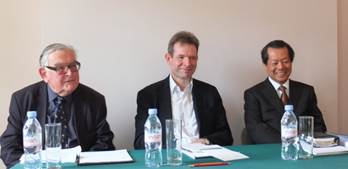
On May 7th, RJIF Chairman Yoichi Funabashi gave a lecture at the Daiwa Anglo-Japanese Foundation in London along with Charles Grant, Director of the Centre for European Reform and Sir Hugh Cortazzi, former British Ambassador to Japan. The session was part of the Daiwa Anglo-Japanese Foundation seminar series, “Diversity in Japan and the UK: Pros and Cons.”
In the 1800s, Charles Darwin visited the Galapagos Islands, where he observed flora and fauna that were highly developed but unable to live outside of their specific environment. Initially used to describe Japan’s mobile phone sector (which is built on highly advanced technology but cannot thrive outside the Japanese domestic market), the term Galapagos Syndrome is symbolic of deeper issues in the island country of Japan. Many of the problems of the “lost decades,” which started after the economic downturn in the early 1990s, such as decreasing competitiveness of Japanese businesses and economic deflation, could have been dealt with more effectively with more external and critical examination.
Japan’s experience has some relevance for the political and social situation in the UK today. Although the UK has been a model of diversity and innovation, it is starting to become more insular and nationalistic, as reflected in the rising popularity of UKIP and the Scottish National Party. Charles Grant, Director of the Centre for European Reform, talked about the UK’s relationship to the EU, the issue of freedom of movement for workers, and what the country may risk if it chooses to leave the EU.
 APIニュースレター 登録
APIニュースレター 登録